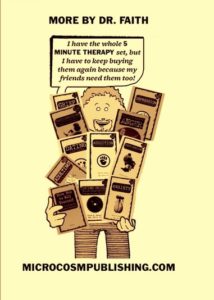This past summer, intern Hanna B. took an interest in Dr. Faith’s books, and asked our favorite foul-mouthed doc a few questions about her work. Then, check out an exclusive excerpt from Dr. Faith’s next book in stores this month: Unfuck Your Adulting.
Everybody struggles at points in their lives. It’s inevitable! Nothing is ever perfect, and there will be times when you will need someone to help you get through the inevitable bumps in the road.
And while often times good friends and a strong optimism can get you through most things, sometimes more professional help is warranted. However, this can be a huge struggle, if not impossible for many, and so we can offer you the next-best-thing: Dr. Faith G. Harper.
Dr. Faith G Harper is a hilarious women with a PhD, who has written multiple zines and books for Microcosm, all about dealing with issues in our own lives, from Unfuck your Brain to her “Five Minute Therapy” zines, she gives you the honest facts on how to deal with whatever you’re dealing with, how it affects your body/brain, and even gives you the tough-love you didn’t know you needed. Her next book, Unfuck Your Adulting, hits stores this month. Filled with humor, science, and damn good advice her writing has the ability to enact positive change within each of us. 
I recently had the chance to connect with Dr. Faith and ask her some questions about her books and zines, her practice, and her writing! For those of you who already know Dr. Faith and are dying to hear more or for those who are just interested in this kick-ass women, here are some words of wisdom from the woman herself.
What drove you to initially take your knowledge/practice and develop them into books?
Faith: Frustration! I write the books I want to read. They didn’t exist and I could bitch about it or write them myself! My first book with Microcosm “Unfuck Your Brain” started with the five minutes of brain science psycho-ed that all my clients get at some point that I had entitled “Brains are Assholes.”
What effect do you see from your writing that differs from your in-person practice?
The most obvious answer is that I get to connect with people in a different way…and connect with people I wouldn’t have come in contact with otherwise, just sitting in my office seeing clients who live in Texas. The more interesting answer that is, in terms of the meta-message of my books, there isn’t much difference. My private practice clients who have read my books say they sound EXACTLY like in-session me. I don’t write any differently from how I talk. I’m not trying to sound hip when I write (because trust, I figured out by age 11 that I am deeply uncool and have made my peace with it). If I say “Dude, that’s fucked up” in my writing, those same words in that same order probably came out of mouth at least three times in the past week with clients. No-one needs me to put on my white coat of expert doctorness, they need me to be authentic and present with them in their experience. The expertise may be the backseat navigator, but they aren’t in charge.
Which of your zines/books have you enjoyed writing the most, and why?
I don’t like rehashing topics that have already been covered. In fact, there are plenty of topics that have been suggested in which my response has been “so and so already wrote that book, wrote it better than I ever could, and I have nothing to add.” So any writing (and research process) in which I end up conceptualizing something in a new way ends up being the most enjoyable (even if it’s harder work in the process). For example, in the Coping Skills book I ended up creating a new category system for types of coping skills. It gave me structure for the book, and I think lends a better understanding to how coping skills can be operationalized. I want mental health strategies to just fucking WORK better. So when I think I hit on something that will make that happen I get all the excites.
(FWIW, I am working on something now, where I ended up changing the model of a psychological concept that has never been fucked with in the past. I may end up in academic purgatory, but I was really struggling with making it more accessible, and the only way I could figure out how to make it work was to add to it!)
What do you hope to do in the future with your writing?
World domination!
Or better yet, creating equal access for mental and emotional health for folx. It shouldn’t be the domain of the elite. If we reduce shame and stigma, and make quality tools that support people’s recovery journeys available for the cost of a paper and cardboard zine we’ve done good in the world.
Want to know more about Dr. Faith?
Check out her books here, and learn a thing or two about being a decent grown-up with this excerpt from Unfuck Your Adulting: Give Yourself Permission, Carry Your Own Baggage, Don’t Be a Dick, Make Decisions, & Other Life Skills: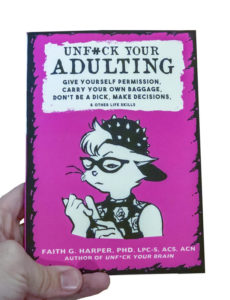
How To Be An Adultier Adult:
#1: DON’T BE A DICK
Growing up, my kids had two household rules: “Don’t be a dick” and “If it’s not yours, don’t touch it.”
(And honestly the second rule is really covered by the first, but a couple people I gave birth to had some struggles with the “stop fucking with other
people’s stuff” portion of the program, so we had Rule Two. But I digress.)
This rule was so well known that everyone who was invested in the welfare of my kids (teachers, counselors, etc.) would invoke it: “Well, are you being a dick right now?”
Thank you, Wil Wheaton, for adding “Don’t be a dick” to our common vernacular. Because, seriously, if you are only going to have one life rule, have it be this one. You don’t need an explanation on this one. You know when you are being a dick. Don’t.
When this now-book was first released as a zine, I wondered if “Don’t be a dick” would resonate and make sense with the people who read it. Or would there be a bunch of “Dude, what the fuck do you mean by that?” going on. Not once has that happened. This is a rule that everyone totally intuits immediately. We know
what dickitude looks like in all its shapes and forms. If we call it out in ourselves and refuse to tolerate it in others, we are already acting way more grown than most motherfuckers out there.
#2: BE A TINY BIT NICER THAN YOU HAVE TO BE
OK, you aren’t being a dick. Badass. Next step? Push yourself to put a little more good into the world than you are required to by the situation present. Say please and thank you. Use markers of respect (ma’am, sir, or whatever is appropriate). Be kind. Tip extra. Hold the door open. Smile sympathetically at the parent with the screaming child. Be engaged, present, and just a little bit more awesome.
Recently, someone kept breaking into our neighborhood mailboxes (because some people haven’t read Rule Number One). This meant the mailman couldn’t leave our mail and it had to be brought back to the post office for pickup. My Boo saw his truck one day and asked him if we could get the mail from him and skip the drive. Mailman said, “I’m totally not supposed to do that, but for you I will. Your wife is always soooo nice to me.”
All I had ever done was to smile and wave when I saw the postman in the neighborhood (you know, like Mr. Rogers taught me to), thank him when he brought me packages, and if I saw him in front of the house, walk out to his truck so he didn’t have to get out. This is small, small stuff. And it’s stuff that most people just
don’t do anymore. We aren’t talking about working in a soup kitchen every Saturday (though that is pretty badass, too). We are just talking about taking the time to recognize and respect other human beings on the planet.
Think about all the times someone being nice to you made your day bearable. Things that were pretty small for them were huge for you in that moment. We can put the same goodwill out into the world. Hell, even if it doesn’t work you totally earn serious karmic power-ups for trying harder than you have to.
This interview was conducted and written by summer intern Hanna B. and the excerpt taken from chapters one and two of Unfuck Your Adulting: Give Yourself Permission, Carry Your Own Baggage, Don’t Be a Dick, Make Decisions, & Other Life Skills by Dr. Faith G. Harper


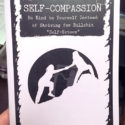


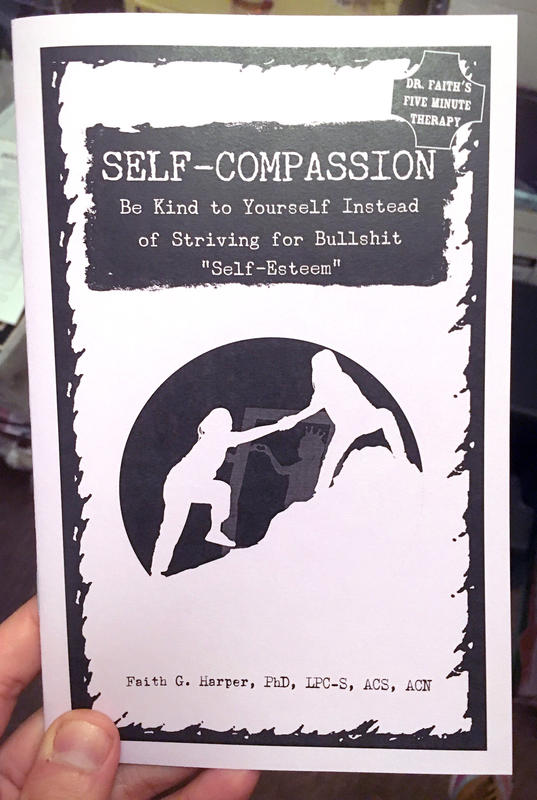

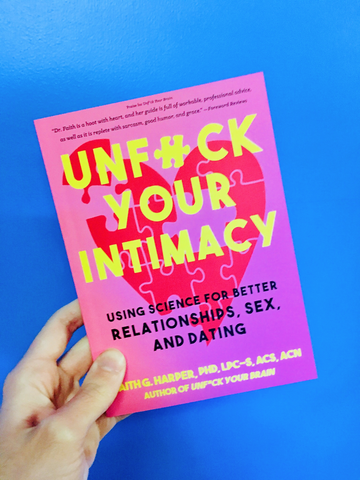
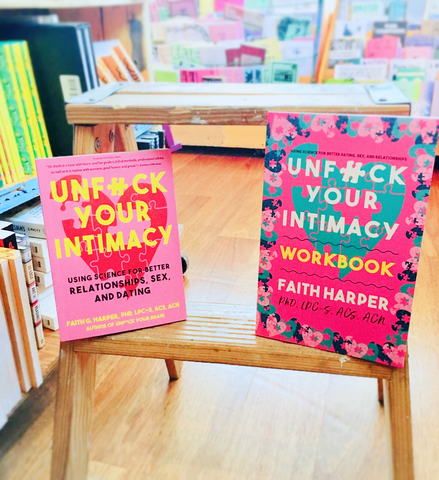

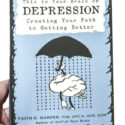


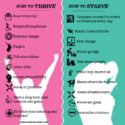
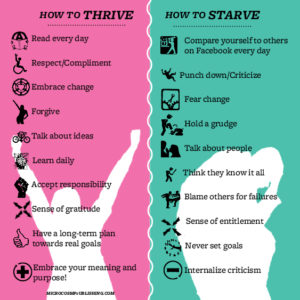
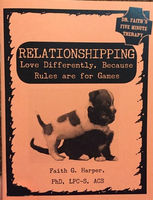 Relationshipping: Love Differently, Because Rules are for Games
Relationshipping: Love Differently, Because Rules are for Games  This is Your Brain on Anger
This is Your Brain on Anger